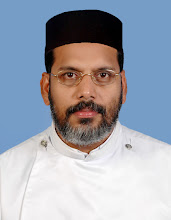Fr Jose Thomas Poovathumkal
Mar Ephraim of Nisibis (St. Ephraim the Syrian), called “the harp of the Holy Spirit,” is the great leader of the Syrian ascetic tradition. He was a spiritual poet, theologian and teacher.
Mar Ephraim was born in or around Nisibis (Mesopotomia), a city in the ancient Roman Empire, in about AD 306. His father was the priest of god Apollo. The boy Ephraim was driven away from home when his father knew that the boy was in touch with Christians. He went to Jacob, the bishop of Nisibis, who baptized him and brought him up. He showed great interest in the study of theological books and in doing kind deeds. He was ordained to the deaconate before the year 338 AD, and remained all his life a deacon.
He was appointed the principal teacher of Nisibis School. He accepted the hard and strict life style of a monk while working as a teacher there. Then he lived a solitary life. He shone as an ideal model of a monk. He ate simple food and wore simple clothes. Though living alone, he was concerned about the problems of the society around him and tried to solve them. He was gifted with elegant language, brilliant imagination, and fine tune in music, spiritual vigour and singular analytical power of a theologian. As a result, he produced many beautiful literary works.
The attack by Persians and immigration to Eddesa (Urhay) were two important incidents in Mar Ephraim’s life. The people of Nisbis prayed, under the leadership of Mar Ephraim, when the Persians prepared to attack Nisibis for the first time. Miraculously the Persians retreated. However, Nisibis was ceded to the Persians and became a part of the Sassanide Empire in AD 367. Then the people of Nisibis immigrated to Eddesa, about 100 miles west of Nisibis in the Eastern Roman Empire, and settled there. St. Ephraim gave them leadership in their long journey and in their settling down there. He also shifted his school from Nisibis to Edesa, the famous School of Persians. There he confronted the heresies of Marcion, Bardaisan, Arius, Eunomius and the Anomeans, the Manichaeans and many others.
Mar Ephraim was living alone in his old age in a cage outside the city of Edessa. Suddenly famine and epidemic broke out in the city. St. Ephraim came out of the cave and gave active leadership to the relief measures. He was nearing his death when he gave the following message to his disciples, “Don’t make any speeches praising me, don’t sing any songs extolling me, don’t arrange any pompous burial, don’t make memorials for me, don’t keep my remains. I am a sinner.” Mar Ephraim died at Edessa in 373.
Literary contributions of Mar Ephraim
His voluminous exegetical, dogmatic, controversial, and ascetical writings are mainly in verse. They include cycles of hymns on great feasts of the Church, on the Last Things and refutations of heretics. He wrote exclusively in Syriac, but his works were translated into Armenian and Greek at an early date.
Exegetical works are in prose and are excellent in their exposition. There are extant commentaries on Genesis and Exodus and there is a beautiful Armenian version of treatise on the Diatheserone of Tatian, Acts of Apostles and the Epistles of St. Paul.
Dogmatic works (Hymns against heresies or Madrose d-luqbal yulpane) are polemical against Mani, Bardaison, Marcion, etc.
Hymns and homilies are many. The main hymns are On Faith, against heresies, Hymns of the Epiphany (Madrose d-denha), On Virginity (Madrose d-‘al btuluta), On the Church, On Paradise, On Crucifixion, On Resurrection, etc. His Nisibene Hymns (Madrose da- Nsibaye), seventy-seven in number, is very famous and it praises St.Mary. He loves to sing her virginity, her divine maternity and her holiness. His homilies (Memre) On faith and On our Lord are very famous. His poems and homilies are doctrinal, moral, polemical and liturgical.
The main teachings of Mar Ephraim
Mar Ephraim wrote in Syriac many valuable works of prose and verse about the Bible, theology and about the life of monks. He explains the theological matters with the sweetness of music in his hymns. For example,
“In the womb of Mary the Infant was formed,
Who from eternity is equal to the Father.
He imparted to us His greatness,
And took on our infirmity.
He became mortal like us and joined his life to ours,
So that we might die no more.”
(Song of Praise 1, 12)
He says that, the humanity and the Divinity were intimately united in Jesus Christ. The Divine nature of the Word was ineffably united to all the parts of the soul and body. Even though, the Incarnation was an entry into the limitation of humanity, the Divine nature remains unchanged. Christ is a unity of God-man. Mar Ephraim’s soteriology is very profound and it confirms that God tasted death for all in His own flesh. The salvation is perfect due to the richness of the suffering and sacrifice of Christ our Lord.
Wednesday, June 30, 2010
Subscribe to:
Post Comments (Atom)

No comments:
Post a Comment